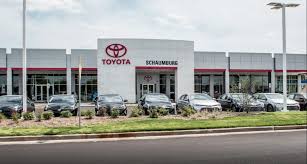Revolutionizing the Car Dealership Experience: Innovations in Automotive Retail

The Role of Car Dealerships in the Automotive Industry
Car dealerships play a crucial role in the automotive industry, serving as the bridge between manufacturers and consumers. These establishments are where the rubber meets the road, where dreams of owning a new vehicle become a reality. Let’s explore the significance of car dealerships in today’s market.
Customer Experience
Car dealerships are more than just places to buy cars; they are experiential centers where customers can touch, feel, and test drive vehicles before making a purchase. The personalized service provided by sales representatives helps customers navigate through various options and find the perfect vehicle that suits their needs.
Sales and Distribution
Dealerships serve as vital channels for manufacturers to distribute their vehicles to a wide customer base. They handle inventory management, pricing strategies, and promotional activities to attract buyers. Through partnerships with financial institutions, dealerships also offer financing options that make car ownership accessible to more consumers.
After-Sales Service
Car dealerships don’t just sell cars; they also provide essential after-sales services such as maintenance, repairs, and warranty support. This ongoing relationship with customers ensures satisfaction and loyalty while enhancing the overall ownership experience.
Economic Impact
Car dealerships contribute significantly to local economies by creating jobs, generating tax revenue, and supporting related industries such as insurance, finance, and maintenance services. They play a vital role in driving economic growth and prosperity within their communities.
Adapting to Change
In an era of digital transformation and changing consumer preferences, car dealerships are evolving to meet new challenges. Online sales platforms, virtual showrooms, and contactless services are becoming increasingly common as dealerships embrace technology to enhance customer convenience.
Conclusion
Car dealerships serve as essential pillars of the automotive industry, connecting manufacturers with consumers while providing valuable services that extend beyond the point of sale. Their role in shaping customer experiences, driving sales, supporting communities, and adapting to change underscores their enduring significance in an ever-evolving market.
Top 7 Benefits of Choosing a Car Dealership
- Wide Selection
- Expert Advice
- Financing Options
- After-Sales Services
- Trade-In Opportunities
- Test Drives
- Promotions and Incentives
Top 5 Drawbacks of Buying from a Car Dealership
- High-pressure sales tactics can make customers feel uncomfortable or rushed.
- Limited negotiation flexibility on pricing due to set profit margins and dealership policies.
- Additional fees and charges, such as documentation fees or dealer add-ons, can increase the overall cost of purchasing a vehicle.
- Dependence on dealership service departments for maintenance and repairs may result in higher costs compared to independent mechanics.
- Risk of encountering dishonest practices, such as misleading advertising or undisclosed vehicle history, that can erode trust between customers and dealerships.
Wide Selection
Car dealerships provide a distinct advantage with their wide selection of vehicles, offering customers a diverse range to choose from based on their preferences and budget constraints. Whether someone is looking for a fuel-efficient compact car, a spacious SUV for family adventures, or a luxurious sedan for executive style, dealerships ensure that there is something for everyone. This variety not only enhances the shopping experience but also increases the likelihood of finding the perfect vehicle that meets individual needs and desires.
Expert Advice
Sales representatives at car dealerships offer a valuable pro by providing expert advice to customers seeking to purchase a vehicle. Their in-depth knowledge and experience in the automotive industry enable them to offer personalized guidance and assistance in selecting the perfect car that aligns with each customer’s preferences, needs, and budget. By understanding the latest trends, specifications, and features of various vehicles, these sales professionals play a crucial role in helping customers make informed decisions and find the ideal vehicle that meets their requirements.
Financing Options
Car dealerships offer a valuable service through their financing options, leveraging partnerships with financial institutions to simplify the process of securing auto loans and payment plans for customers. This convenience not only streamlines the purchasing journey but also expands accessibility to car ownership by providing tailored financial solutions that meet individual needs. By offering a range of financing options, dealerships empower customers to make informed decisions and drive off the lot in their desired vehicles with confidence.
After-Sales Services
Car dealerships provide a valuable pro in the form of after-sales services, including maintenance, repairs, and warranty support. By offering these essential services, dealerships play a crucial role in ensuring ongoing customer satisfaction and prolonging the longevity of vehicles. Customers can rely on dealerships to address any maintenance or repair needs promptly, backed by warranty support that gives them peace of mind. This commitment to after-sales care not only enhances the overall ownership experience but also fosters trust and loyalty between customers and dealerships.
Trade-In Opportunities
One significant advantage of car dealerships is the trade-in opportunities they offer to customers. By allowing customers to trade in their current vehicles, dealerships streamline the process of upgrading to a new car. This convenience not only simplifies the transaction for customers but also provides them with a hassle-free way to transition to a newer vehicle while potentially offsetting the cost through the trade-in value of their existing car.
Test Drives
One significant advantage of car dealerships is the opportunity they provide for customers to take test drives. By offering test drives, dealerships allow prospective buyers to get behind the wheel and experience the performance, comfort, and features of a vehicle firsthand. This hands-on experience plays a crucial role in helping customers make informed decisions about their purchase, ensuring that they find a vehicle that not only meets their needs but also exceeds their expectations.
Promotions and Incentives
Car dealerships offer a valuable benefit to customers through promotions and incentives that can significantly reduce the cost of purchasing a vehicle. These special offers, ranging from discounts to promotional financing rates, provide customers with opportunities to save money and make owning a car more affordable. By running these promotions, car dealerships not only attract more buyers but also create a win-win situation where customers can enjoy savings while dealerships boost their sales volume.
High-pressure sales tactics can make customers feel uncomfortable or rushed.
High-pressure sales tactics employed by some car dealerships can create a stressful and uncomfortable environment for customers, often making them feel rushed into making a decision. The relentless push to close a sale can overshadow the customer’s needs and preferences, leading to a lack of trust and satisfaction in the buying process. This coercive approach may deter potential buyers from engaging with the dealership further and tarnish the reputation of the industry as a whole. Customer-centric practices that prioritize transparency, respect, and informed decision-making are essential to fostering positive relationships and ensuring a positive car-buying experience.
Limited negotiation flexibility on pricing due to set profit margins and dealership policies.
One significant drawback of car dealerships is the limited negotiation flexibility on pricing that customers often encounter. This limitation stems from set profit margins and dealership policies that restrict the extent to which sales representatives can adjust prices during negotiations. As a result, customers may feel constrained in their ability to haggle for better deals or discounts, leading to a less satisfying purchasing experience. The lack of pricing flexibility can sometimes hinder the potential for reaching mutually beneficial agreements between buyers and dealerships, impacting the overall transparency and fairness of the transaction process.
Additional fees and charges, such as documentation fees or dealer add-ons, can increase the overall cost of purchasing a vehicle.
One significant drawback of car dealerships is the imposition of additional fees and charges, such as documentation fees or dealer add-ons, which can significantly inflate the total cost of purchasing a vehicle. These extra expenses, often undisclosed or unclear to buyers during the negotiation process, can catch customers off guard and strain their budgets. The practice of tacking on unnecessary fees diminishes transparency and erodes trust between dealerships and consumers, making it essential for buyers to carefully scrutinize all costs associated with a vehicle purchase to avoid unexpected financial burdens.
Dependence on dealership service departments for maintenance and repairs may result in higher costs compared to independent mechanics.
Dependence on dealership service departments for maintenance and repairs may lead to higher costs compared to independent mechanics. Car dealerships often have higher overhead expenses, including brand-specific diagnostic equipment and specialized training for their technicians, which can translate to higher service prices for customers. Additionally, dealerships may recommend more frequent maintenance or repairs than necessary to boost revenue, potentially resulting in inflated costs for consumers. Seeking out independent mechanics who offer quality services at competitive rates can be a cost-effective alternative for car owners looking to save money on routine maintenance and repairs without compromising on quality.
Risk of encountering dishonest practices, such as misleading advertising or undisclosed vehicle history, that can erode trust between customers and dealerships.
The risk of encountering dishonest practices within car dealerships, such as misleading advertising or undisclosed vehicle history, poses a significant con that can erode trust between customers and dealerships. When customers are misled or provided with incomplete information about a vehicle’s background, it can lead to dissatisfaction, disputes, and a breakdown in the customer-dealership relationship. Such unethical practices not only harm individual customers but also tarnish the reputation of the dealership industry as a whole, highlighting the importance of transparency and integrity in all business dealings.



